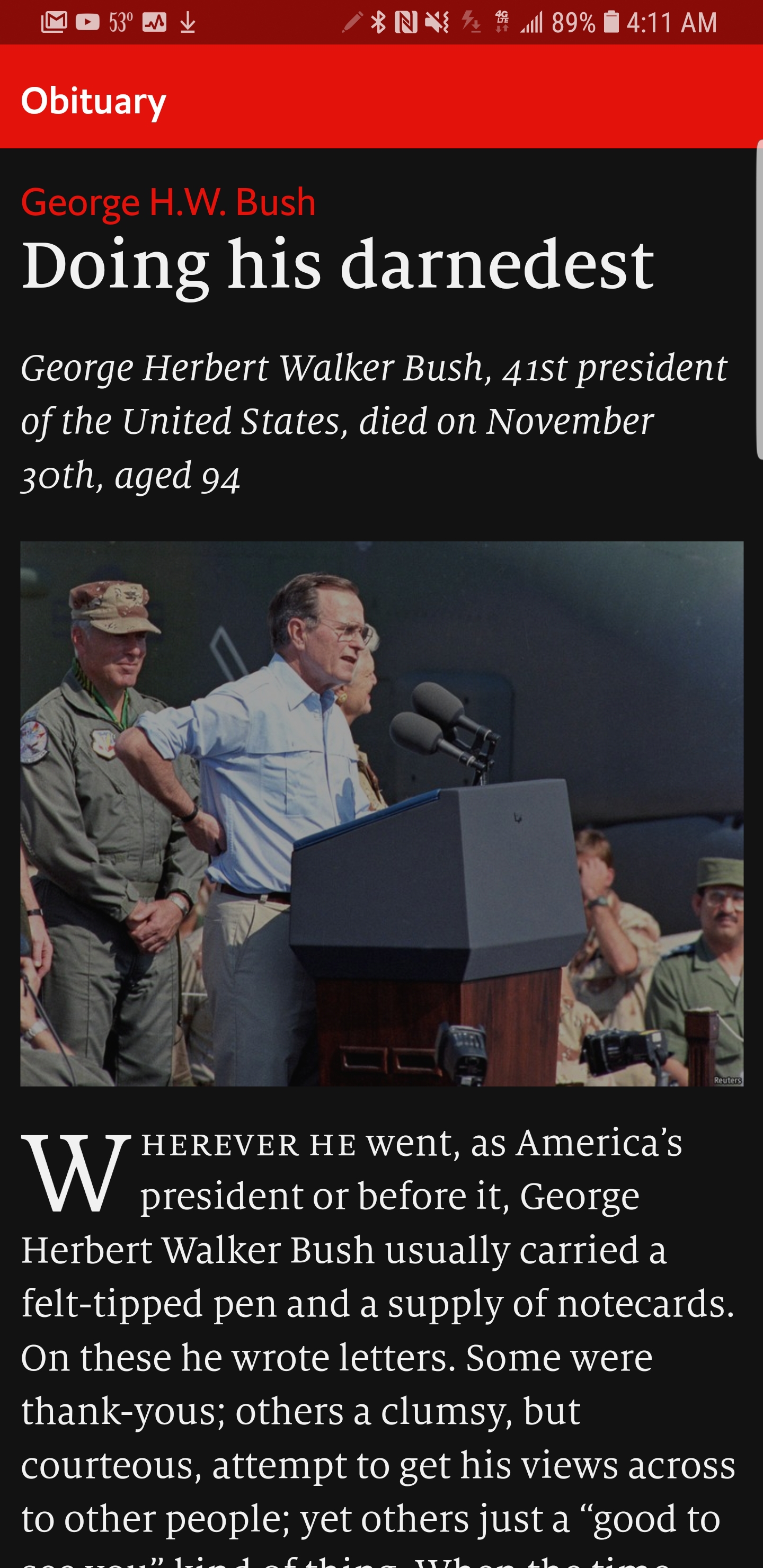Obituary
George H.W. Bush
Doing his darnedest
George Herbert Walker Bush, 41st president of the United States, died on November 30th, aged 94

Wherever he went, as America’s president or before it, George Herbert Walker Bush usually carried a felt-tipped pen and a supply of notecards. On these he wrote letters. Some were thank-yous; others a clumsy, but courteous, attempt to get his views across to other people; yet others just a “good to see you” kind of thing.
When the time came to write his presidential memoirs, to salve some of that desperate hurt after Bill Clinton thrashed him in 1992, he published instead 600-plus pages of correspondence. They ranged from doting letters to newborn grandchildren to his worries, as a young seaman in 1943, that his girlfriend Barbara, “so darn attractive”, would drop him while he was away; from his attempt to explain the Watergate scandal to his four young sons, to his mortified account of throwing up in 1992 on the Japanese prime minister, “the damnedest experience”.
He admitted that some of the letters were nutty. But they were also of the moment. As he said, “It’s all about heartbeat.”
In one letter he happened to mention a childhood rebuke from his mother: “Now, George, don’t walk ahead.” He took her words to heart, staying, for most of his political career, loyally behind and modestly to one side. As chairman of the Republican National Committee in 1974, he stuck by Richard Nixon until it became more urgent to save the party; at which point, he publicly asked him to resign. He felt afterwards as though someone had died.
In his eight years as Ronald Reagan’s vice-president, though they had sparred bitterly in the 1980 primaries over Reagan’s “voodoo economics” and his callow Hollywood sparkle, he never criticised or upstaged him. During the Iran-contra affair of the 1980s, though present at many salient meetings, he declared himself out of the loop, and it was hard to prove otherwise.
The vision thing
People often supposed him out of the loop in other ways, too: a boy born to privilege, called “Poppy” by his parents, a product of Phillips Academy and Phi Beta Kappa at Yale, who was (falsely) rumoured in the 1992 campaign never to have passed a quart of milk through a supermarket scanner. He was a Yankee aristocrat who could have followed his Daddy on to Wall Street but instead became a Texas oil man (the only Texan, growled Speaker Jim Wright, who ate lobster with his chilli), and went on to represent the toniest bit of Houston in Congress.
All this, as well as the tennis-playing summers in Kennebunkport, seemed to set him firmly apart from the average Joe, though he let it be known as president that his favourite food was pork rinds, and banned from the White House the broccoli his mother had made him eat.
With the label “preppy” came the tag “wimp”, which infuriated him far more. He had had a brave war, enlisting at 18 and completing one mission with his aircraft on fire.
Later he did not hesitate to send 27,000 troops to dislodge Manuel Noriega from Panama, or to launch a ground war against Saddam Hussein in 1991—declaring victory and pulling out in 100 hours, which pushed his approval ratings to 89%. He was not above nasty attack ads in the 1988 campaign, excoriating Michael Dukakis for giving furlough to a black rapist. But Nixon, who hated Ivy Leaguers, seemed to think him soft; Reagan said he lacked spunk; and his talk of “Big Mo” and “kicking ass” on the campaign trail often ended in retreat.
In 1990 a dust-up with Congress forced him to capitulate on his steely election pledge of “No new taxes”. This, as well as the brief recession of 1990-91, cost him the 1992 election, though even as voters went to the polls the figures for growth were ticking upwards, ushering in almost a decade of prosperity.
What he lacked, as he more or less admitted, was “the vision thing”. Ideologically, he was flexible: moderate sometimes (indeed, in one Texas race, left of the Democrat), while at others he would traipse round pandering to conservatives, as George Will cruelly put it, with a thin tinny “arf”, like a lap-dog. On domestic policy, as president, he inclined to the hard right (prayer in schools, gun rights, anti-abortion), while also loosening immigration policy and expanding the rights of the disabled. Wearing his mild Episcopalian hat, he mentioned a thousand points of light, a kinder, gentler America, and a new breeze blowing away the leaves of an old tree. It was all as vague as it was all deeply hoped for.
His forte, and first love, was foreign policy. He had been ambassador to the unfor Nixon, an envoy to China for Gerald Ford (he and Barbara riding round delightedly on bicycles) and head of the cia, besides, as vice-president, a follower-of-the-hearse at dozens of state funerals. Instinctively, he thought in terms of global power games; fortuitously, his time as president coincided with the end of the cold war, a heady and fascinating moment.
With Mikhail Gorbachev he struck up an easy working friendship, and in 1991, in the wake of the Gulf war, he even had a moment of comprehensive vision: a new world order, based not on force but on the rule of law, which America would strongly lead.
Such grandiloquence, like eloquence, was rare in him. He was schooled in modesty, fond of the small behind-the-scenes gesture rather than the large public show. He belonged to a generation that had no patience for today’s blowhards who, putting self before nation, always push themselves forward. But when the times and events demanded he could, perhaps to his own surprise, find the right words and walk confidently ahead.

